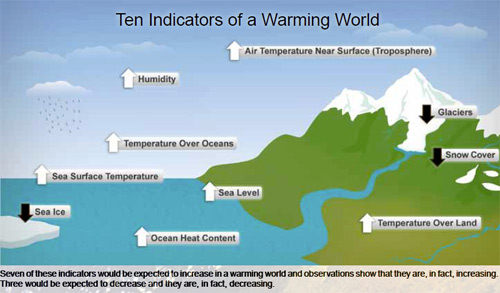10 key climate indicators all point to the same finding: global warming is unmistakable
Posted on 29 July 2010 by John Cook
A common theme expressed at Skeptical Science is that to understand climate, you need to look at the full body of evidence. To help people assess the evidence, NOAA have just published State of the Climate 2009. The report defines 10 measurable planet-wide features used to gauge global temperature changes. All of these indicators are moving in the direction of a warming planet.
Seven indicators are rising: air temperature over land, sea-surface temperature, air temperature over oceans, sea level, ocean heat, humidity and tropospheric temperature in the “active-weather” layer of the atmosphere closest to the Earth’s surface. Three indicators are declining: Arctic sea ice, glaciers and spring snow cover in the Northern hemisphere. Jane Lubchenco sums it up well:
"For the first time, and in a single compelling comparison, the analysis brings together multiple observational records from the top of the atmosphere to the depths of the ocean. The records come from many institutions worldwide. They use data collected from diverse sources, including satellites, weather balloons, weather stations, ships, buoys and field surveys. These independently produced lines of evidence all point to the same conclusion: our planet is warming."
I suggest checking out the site as it has some great resources. There's a short video introducing the report. My favourite line from this is Deke Arndt's line, "Climate trains the boxer but weather throws the punches". If you want a quick summary, jump to the press release. There's DIY Climate Indicators with interactive displays and access to data set. And of course there's the full report (6.6Mb PDF).































 Arguments
Arguments
































[Daniel Bailey] Actually, JMurphy already had given you a TON of quality threads that completely rebut & overturn every point you were making, starting here.
And gutless (your term) is not sticking around to defend your not-so-strongly-held positions on a topic (climate change) that so many here know far more about, and want to help you learn, than do you.
And I have been to your site.
If it's an honest, open dialogue you seek, and you honestly wish to learn more about this topic without accusations and recriminations, then I will dialogue with you. Anything else, it's your loss.